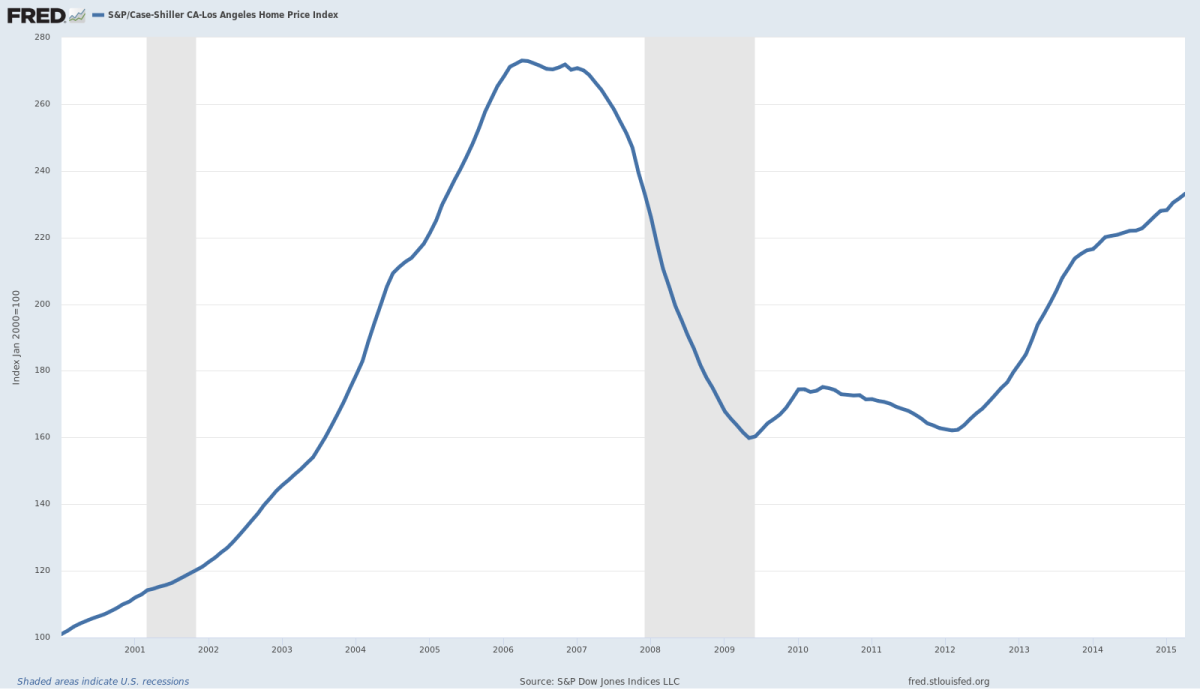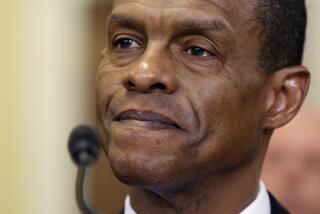Farewell to Mark Kleiman, one of America’s great sages in public affairs

- Share via
Looking back, there seem to be few issues of public debate on which Mark A.R. Kleiman didn’t contribute his judicious, well-researched and often contrarian insights.
Nuclear power? Check. The housing bubble? Check. And of course criminal justice and drug policy, the fields in which he certainly was best known.
We say “looking back,” because Kleiman passed away on June 22 of complications from a kidney transplant and cancer.
A stout and cantankerous liberal, he sometimes anchored the right flank of criminal justice and drug policy research produced by a scholarly community occasionally rendered brittle by ideological conformity.
— Harold Pollack, University of Chicago
This appreciation therefore may be a bit late, but Kleiman’s career demands thorough consideration. In the days since his passing, remembrances and appreciations have flowed in from colleagues and admirers among policy wonks, the institutions where he taught and fellow bloggers.
Memorials have come from UCLA’s Luskin School of Public Affairs, where Kleiman taught from 1996 to 2015, ultimately holding the post of emeritus professor of public policy. He left UCLA to join New York University.
Kevin Drum of Mother Jones contributed a reminder that Kleiman started his blog, mischievously titled “The Reality-Based Community,” in 2002, when public policy blogging was in its pre-adolescence. (The title was a jujitsu gloss on a remarkably stupid remark by an aide to President George W. Bush — rumored to be Karl Rove — that Bush’s critics were hamstrung in understanding his policies by their residence in the reality-based community.)
“To most of the world, Mark was a brilliant criminology scholar with a particular expertise in drug policy,” Drum wrote. “To me, he was a friend and fellow blogger who just happened to also be a brilliant criminology scholar.”
My own first contact with Kleiman came in 2005, when I wrote about his decision to “short” the Los Angeles housing market: He had sold his 2,700-square-foot, four-bedroom Mulholland Drive home at a price that brought him roughly a 62% gain over the price he paid in 1997 and the cost of a sizable remodeling in 2001, and would lease instead a two-bedroom apartment in Brentwood.
Strictly speaking, he wasn’t shorting the market so much as moving to the sidelines, figuring he could buy back in after a crash he was sure was coming.

“If prices start to drop as interest rates rise,” he blogged, “there are lots of people who will (1) have trouble making the payments on their variable-rate mortgages and (2) find themselves ‘under water,’ with negative equity in their houses. Sounds to me like a recipe for panic.”
He was right, if just a tad premature. Home prices in Los Angeles kept rising for another year or so, but then began a nauseating plunge that didn’t bottom out until mid-2012. The point is that Kleiman took his stand at a time when his forecast of a downturn was, if not necessarily unique, certainly was unfashionable. It also was well grounded in empirical research. And, to most experts, unobvious — except in retrospect.
When we first examined the potential flashpoints between the incoming Trump administration and California, marijuana ranked fairly low on the list, below climate policy, immigration and Obamacare.
Those were the defining qualities of Kleiman’s entire intellectual body of work. Harold Pollack of the University of Chicago mentions Kleiman’s “irreverence for settled pieties,” adding that, “a stout and cantankerous liberal, he sometimes anchored the right flank of criminal justice and drug policy research produced by a scholarly community occasionally rendered brittle by ideological conformity.”
Consider his work on drug policy, where he exercised tremendous influence. Kleiman was an advocate of legalizing marijuana, but a fierce critic of the process that unfolded in Washington and Colorado (and that has been largely replicated in California).
He was skeptical of the state-by-state approach to legalization, which made the federal government a helpless bystander and left open the prospect that the hands-off federal stance of 2012 would eventually yield to resumption of federal enforcement by another president — as almost happened under Trump. He had no use for the ancient glorification of states as “laboratories of democracy,” in Louis Brandeis’ phrase. “Dr. Frankenstein also had a laboratory,” he wrote.
Less than two weeks ago, to a blare of orchestrated praise, the U.S.
The real danger, he argued, was that the piecemeal approach would leave the feds permanently on the outside of enforcement, for precisely the right moment for Congress to step in with a federal law legalizing and regulating the pot industry was when the industry was too small, poor and fragmented to lobby against effective federal regulation. But it’s only going to get bigger and richer from here, he warned, and it wouldn’t be long before it has the deep pockets to block effective federal oversight, like the liquor industry.
Kleiman was fully alive to the downsides of marijuana legalization, including increased abuse and marketing to minors. He advocated keeping regulation out of the hands of state tax and revenue departments, which would favor expanded sales, and placing it with the public health department, which would prefer to keep a lid on the market.
Kleiman’s work on drug policy was a subset of his work on criminal justice. The best example of his care and judiciousness might be his retrospective on the 1994 crime bill, which had become a cudgel to attack Hillary Clinton from the left in her 2016 presidential campaign, since the bill had been passed during her husband’s presidency.
The government’s penchant in white-collar-crime cases for charging corporations with wrongdoing, rather than the human beings who make the decisions and pocket the proceeds, is a flaw in our justice system that lets wrongdoers off the hook.
The measure encompassed the Violence Against Women Act and the last assault weapons ban, as well as a program to place 100,000 more police on the streets and money to build more prisons. “That bill was a mix of provisions, including, as usual, the good, the bad, and the ugly” Kleiman wrote. “Some of what seemed good at the time to progressives actually hasn’t turned out to be of much use; some of what seemed bad at the time to progressives (especially ‘100,000 cops’) has turned out to be hugely beneficial to poor minorities living in big cities; and much of the ugly stuff just hasn’t mattered, though the really ugly prison-building provisions mattered a lot.”
What most critics forgot by 2016, he observed, was the atmosphere in 1994. Murders were at an all-time high, about half of the victims African American. No one could foresee that crime rates actually had peaked in 1994 and were on their way down. So some of the law’s provisions were reasonable responses to a trend that Americans saw continuing into the limitless future.
“Among the worst ideas” in the bill was “building more prisons,” Kleiman wrote, noting that “both deterrence and incapacitation are subject to the law of diminishing returns. When the prison population is small, it consists mostly of serious, high-rate offenders, because prosecutors and judges try to single them out. ... When the population grows, it grows mostly by adding less and less dangerous people. So there was really no reason to think that adding yet more prisons would do much to stem the crime wave.”
Through his blog, Kleiman showed his capacity to weigh in on a wide range of topics. He was a foe of dogma, left or right. In 2004 he wrote: “The first time I learned that something widely accepted as a core piece of liberal dogma could be flat-out wrong involved the topic of nuclear power.” He thought it was a necessary component of energy policy. “Nukes, if run right, are fully competitive with coal, and a hell of a lot cleaner.”
This is true, though Kleiman himself acknowledged it was true ... IF. He ascribed the decline of the American nuclear power industry to several discrete factors. One was the “idiotic regulatory process in the U.S.,” which allowed nuclear plants to be run by companies that are basically amateurs in the nuclear business — i.e., utilities. He blamed Naderite evironmentalists for stirring up alarmist opposition in local communities. Finally, he cited excessive concern about nuclear waste, which he argued overlooked the fact that only a small proportion of the waste from nuclear generators was high-level waste requiring long-term care.
One can cavil at some of Kleiman’s technical observations, but he saw that nuclear power was useful, at least as a bridge technology to a cleaner future of renewables. That view is not unorthodox, even today.
There’s so much more to the breadth of Kleiman’s contributions than can be cited that one might as well stop here. As David Ramsey wrote in the Colorado Springs Gazette, “Mark Kleiman was out of place in modern America, which is a compliment to him. ... He understood a crucial truth about life: It’s complicated.”
More to Read
Inside the business of entertainment
The Wide Shot brings you news, analysis and insights on everything from streaming wars to production — and what it all means for the future.
You may occasionally receive promotional content from the Los Angeles Times.













